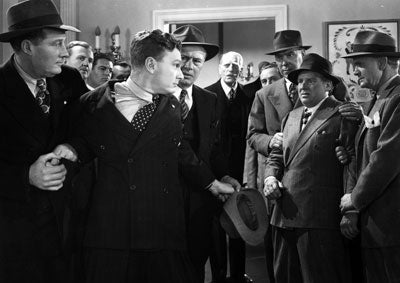Directed by Allan Dwan
Republic Pictures Corp. Screenwriters: Mary Loos and Richard Sale. Cinematographer: Reggie Lanning. Editor: Arthur Roberts. With: Eddie Albert, Faye Marlowe, C. Aubrey Smith, Gail Patrick, William Frawley. 35mm, b/w, 80 min.
Corporal Jeffrey Dolan (Eddie Albert), stationed in London with the US Army Air Transport Command during World War II, badly misses his wife Annie (Faye Marlowe), whom he left Stateside. Taking pity, two buddies fly him, AWOL, on their assigned mission to the United States, facilitating a secret, overnight, anniversary visit. At the war’s end, when Jeff returns home legitimately, he is surprised to learn that Annie has just given birth to a new son, raising uncomfortable questions of family honor among the local citizenry. Complications are compounded when Jeff learns that his legal heir is due a large inheritance, raising the question: how will he establish his son’s claim? A comedy of errors ensues, in which Army buddies, a foreign diplomat and nightclub singer “Dolores Starr” (a delightfully droll Gail Patrick) all pull together to put things right.
With this charming picture, Allan Dwan, a prolific director since the days of silent film, began a productive period at Republic directing B-pictures. In particular, he evokes an impressive performance from Eddie Albert, as a tender-hearted husband who might otherwise have seemed a mere plot contrivance. Co-screenwriters Mary Loos (niece of screenwriter Anita Loos) and Richard Sale adapted the scenario from their previously-published magazine story, and despite some logical leaps and a surfeit of plot twists, their narrative deals tastefully with its potentially discomfiting theme of marital infidelity and manages some affecting and memorable moments: notably, the scene in which Jeff waits out a German bombing in a London basement, bonding with “old duffer” Sir Archibald Clyde (C. Aubrey Smith) over a detailed description of his wife’s heavenly chocolate cake. Released a year after the end of World War II, the film adeptly struck well-worn, sentimental notes about the recent conflict. But with the United States still widely deployed across the globe (especially in light of mounting post- war tensions with the Soviet Union) it can be understood as a caution to servicemen and other Americans to remain vigilant. Tellingly, as Jeff Dolan relates his tale of woe to Dolores, he states, “then the war ended,” to her immediate response, “says you.”
Shannon Kelley
Preserved in cooperation with Paramount Pictures from a 35mm nitrate composite fine grain master positive. Laboratory services by The Stanford Theatre Film Laboratory, Audio Mechanics, DJ Audio.







